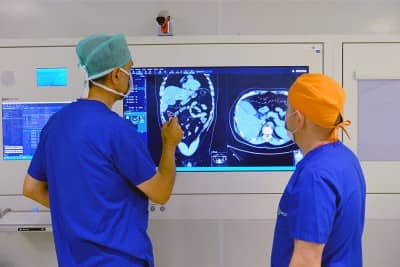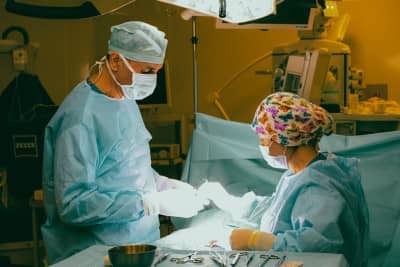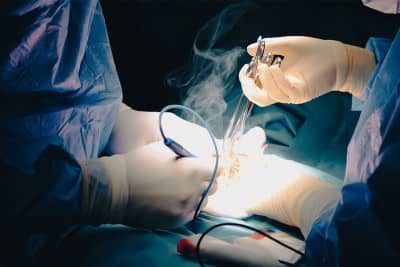- E-Magazine
The field of General Surgery has a wide area of interest. It can be defined as the treatment of diseases that occur in patients over 18 years of age, diseases that do not heal with medication or other treatment methods, injuries or deterioration of body functions. In a broad definition; It is a department that deals with digestive, endocrine, hepotbiliary sutures, benign tumors, cancers, anorectal disease groups.
Contents
This department can be classified as Robotic Surgery, Laparoscopic Surgery or Endoscopic Surgery. Generally, operations including goiter, breast, hernia, esophagus, stomach, rectal crack, rectum, adrenal gland, liver, biliary tract, stomach hernia and cancer surgeries are performed.
What is General Surgery?
General surgery is a method applied by repairing the organ or cutting out the problematic organ with surgery in diseases that cannot be treated by applying drug therapy or different medical treatment methods. This department, which has a wide field of study, cooperates with departments with expertise in other fields such as oncology, endocrinology and traumatology.
Surgical procedures are operations performed by general surgeons and specialist doctors. Anesthesiologists, nurses and surgical technicians are known as part of the team.
Information about the pre- and post-operative process is conveyed to the patient by surgeons. Surgeons who perform surgeries on many different subjects, usually emergencies, treat many disorders and diseases with advanced technology.
Which Diseases Does General Surgery Treat?
This department, which looks at a wide range of diseases, is usually the area where many types of diseases are examined and treated, as well as the abdomen and the organs connected to this region.
In addition to these, the answers to the question of which diseases general surgery looks at are as follows:
- Gastrointestinal
- Anal Region
- Intra-abdominal Masses
- Liver
- Gall Bladder
- Spleen
- Above Kidney Glands
- Internal and External Hernias Related to the Abdominal Cavity
- Reflux Disease
- Varicose veins
- Inguinal Hernia and Stomach Hernia
- Breast Diseases (such as Fibrocyst, Fibroadenoma)
- Thyroid Diseases (such as goiter)
- Breech Crack (such as Anal Fissure)
- Anal Fistula
- Pancreatitis
- Body Masses (Lipoma, Fat Glands)
- Sebaceous Cyst
- Ingrown Hair (Pilonidal Sinus)
With the development of technology, videoendoscopic (laparoscopic) surgery, laser surgery, minimally invasive surgery with percutaneous interventional procedures, as well as open and closed multidisciplinary interventions are carefully performed with rich and powerful medical devices. Equipped operating room and intensive care facilities, communication and collaboration with other branches are the biggest support and the patient's well-being is one of our happiest expectations.
General Surgery Departments
In this department, where many diseases and disorders are treated, specialized surgeons work in cooperation with specialist doctors in different fields. This field, which covers many diseases, plays a role in the treatment process of diseases that cannot be treated with medication or cannot be cured by medical methods.
General Surgery departments can be listed as follows:
- Gastrointestinal System
- Intra-abdominal
- Digestive System
- Skin and Soft Tissue Surgeries
- Breast Diseases
- Endocrine System
- Surgical Oncology
- Surgical Intensive Care
- Traumatology
- Vascular Surgery
- Transplantation Surgery
- Cardiovascular Surgery
- Pediatric Surgery
- Pediatric Cardiovascular Surgery
- Thoracic Surgery
- Plastic Surgery
- Plastic and Reconstructive Surgery
- Orthopedics and Traumatology
- Obesity Surgery
Which Surgeries are Performed in General Surgery?
In NPISTANBUL Hospital General Surgery Service , where client satisfaction and treatment success are kept at the highest level ; patient-centered, qualified, reliable and medical success is focused on "excellence in health".
Services are provided in a hospital with expert staff, infrastructure equipped with the latest technology and JCI accreditation certificate. Surgeries can be performed with open and closed methods in our hospital. Liver, pancreas, intestines are the first ones that come to mind.
In addition to these, the surgeries performed in General Surgery are as follows:
- Obesity surgeries
- Stomach reduction surgeries
- Thyroid
- Meme
- Stomach
- Esophagus
- Liver
- Pancreas
- Spleen
- Intestines
- Intra-abdominal mass
- Stomach, Abdominal and Inguinal Hernias
- Inguinal Hernias
- Circumcision
- Anal abscess
- Appendicitis
In addition, treatment and surgical operation of operable cancer cases can be performed within the scope of this department.
In NPISTANBUL Hospital General Surgery Service; Turkey's first and only 1A Ultra Clean operating room equipment was created with an infrastructure. Our hospital has 2 operating rooms, one 1A and the other 1B, and an intensive care unit with a capacity of 16 beds. In the intensive care unit, full-fledged service can be provided to intensive care patients at all levels up to Level 3.
General Surgery Diagnostic Methods
With a client-oriented approach, the process begins by listening to the history of the disease in detail. The disease is diagnosed and the treatment process begins by learning about previous illnesses, physical examination, necessary biochemical and radiological examinations and, if necessary, utilizing nuclear medicine facilities.
Differential diagnosis is made for similar diseases. For other system examinations, appropriate treatment is planned in consultation with the relevant specialists. In these procedures, the facilities in the laboratory and radiology centers of our hospital are utilized.
The presence of an intensive care unit with advanced facilities after surgery is an important source of confidence for the patient and the physician.
General Surgery Treatment Methods
Depending on the organs or systems in which the surgical operation will be performed, it is determined by which department of this field the treatment will be performed. Surgical operations of this field, which cooperates with many departments, are performed with different methods.
In closed surgeries, endoscopic and laparoscopic systems are generally used to ensure rapid postoperative recovery. Depending on this situation, closed surgeries are frequently preferred by doctors and patients.
While most of the cases are oncology patients, operations of tumors that occur in different parts of the body are treated together with surgeons and doctors who are specialists depending on the region where the organ is located.
People over 18 years of age can be treated with surgical intervention when the surgeon deems appropriate in treatment methods determined according to their health status and the condition of the diseased organ.
In surgeries that can be performed with open or closed methods, highly technological devices used by specialized surgeons are preferred. Types of surgery are generally determined according to the organ or the system to which it is connected.
Some surgical applications are also available in our hospital. Many surgical operations such as laparoscopic surgery, obesity surgery and stomach reduction operations are also performed.
General Surgery Applications at NPISTANBUL Hospital are as follows:
Laparoscopic Surgery
Laparoscopic surgery, one of the general surgery methods, is based on the principle of visualizing the abdominal organs by inserting a thin telescope through the belly button into the abdomen. Laparoscopy surgery is performed under general anesthesia.
Laparoscopic surgery, also known as "closed", "knife-less" or "bloodless surgery", allows direct observation of the disease or problem by illuminating the abdomen.
In this method, if necessary, treatment is applied with auxiliary devices inserted through 3-5 mm holes drilled at various points in the abdomen at the same time. With these devices, all of the intra-abdominal organs can be evaluated from a wider angle with magnification during the operation.
Laparoscopy operations; It is applied in many surgical procedures, especially in obesity treatment, gallbladder, inguinal hernia, appendicitis, reflux and stomach hernia.
Obesity Surgery
Obesity surgery, which falls within the field of general surgery, is performed by the General Surgery Specialist and his team at NPISTANBUL Hospital for the treatment of diabetes and obesity.
Stomach reduction and intestinal shortening surgeries that can be performed together can be performed, and all interventions accepted in the world for obesity and diabetes surgery can be performed.
These operations are not applied to every patient. In order for the operations to be successful, a detailed consultation is required before the operation. In our hospital, a comprehensive diagnostic process is initiated based on the complaints of our clients. If our specialists find it appropriate, the necessary surgical intervention is applied.





